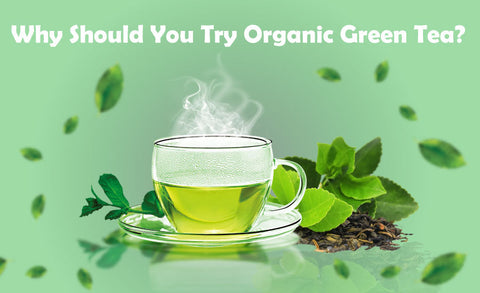The Ultimate Guide to Organic Green Tea
In recent years, the popularity of organic green tea has soared—and for good reason. With a refreshing taste and an impressive list of health benefits, green tea has become a daily ritual for many. In this comprehensive guide, we’ll explore what sets it apart, how to choose the best green tea, brewing techniques, the different types and flavours, and even how to use green tea in your cooking. So grab your favourite cup and let’s explore the wonders of organic green tea.
What Makes Green Tea Organic?
Before diving into the health benefits, it’s helpful to understand what makes green tea “organic.”
Organic green tea is cultivated without synthetic pesticides, herbicides, or genetically modified organisms (GMOs). It’s grown using natural farming methods that protect the environment and promote soil health.
When shopping, look for certifications such as USDA Organic—these ensure that your green tea meets strict organic farming standards and is free from harmful chemicals. All teas from In Nature Teas are of the highest, purest quality and organic.
Health Benefits of Organic Green Tea
Antioxidant Powerhouse
Green tea is rich in antioxidants like catechins, which fight free radicals, reduce cell damage, and lower the risk of chronic diseases like cancer.
Supports Weight Management
Green tea can help increase metabolism and fat burning, making it a great companion for weight management or weight loss.
Improves Heart Health
Drinking green tea may help lower LDL cholesterol, improve blood flow, and reduce the risk of cardiovascular diseases.
Boosts Mental Clarity and Focus
The unique blend of caffeine and L-theanine in green tea promotes alertness without the jitters, enhancing focus and calm.
Can Green Tea Help You Lose Weight?
Yes—green tea supports fat oxidation and may help suppress appetite. Combine it with a healthy diet and exercise routine for best results.
How to Choose the Best Organic Green Tea
When buying organic green tea, keep these tips in mind:
-
Reputable Brands: Look for well-known tea producers with strong sustainability values.
-
Organic Certification: Certifications like USDA Organic ensure your tea is truly organic.
-
Origin and Sourcing: Learn where the tea is from—Japanese Sencha and Chinese Dragonwell are highly regarded.
-
Packaging: Choose teas in airtight, opaque containers to maintain freshness.
Brewing and Enjoying Organic Green Tea
Brewing green tea is more than just making a drink—it’s a mindful ritual. Here's how to make the perfect cup.
Brewing Techniques for Maximum Flavour
-
Water Temperature and Time: Heat your water to around 80°C (175°F). Avoid boiling water as it scorches the leaves. Steep for 2–3 minutes.
-
Use Quality Leaves: Opt for loose leaf organic green tea with fresh, whole leaves.
-
Right Tools: Use a clean teapot or infuser that allows the leaves to expand fully.
-
Additions: Try lemon, fresh mint, honey, or agave for a flavour twist.
Enhancing the Experience
-
Sip slowly and mindfully.
-
Brew in a quiet space for a meditative moment.
-
Inhale the aroma before sipping.
-
Use a porcelain or glass cup to appreciate the clarity.
-
Pair with light snacks like fruit or rice crackers.
Organic green tea is a simple yet powerful way to enhance your health and wellbeing. Whether you’re drawn to its taste, health perks, or relaxing ritual, make sure to choose high-quality, certified organic products and brew with intention. With every cup, you’re not only sipping on flavour—you’re nourishing your body and mind.
Frequently Asked Questions
How much organic green tea should I drink daily?
A good daily intake is 2–3 cups (240–350 ml). This provides a healthy amount of antioxidants without overloading on caffeine.
Does organic green tea contain caffeine?
Yes, but much less than coffee. A typical cup has about 20–45 mg of caffeine. You can opt for decaffeinated green tea if you’re sensitive.
Can pregnant women drink organic green tea?
Yes, but in moderation. Since green tea contains caffeine, it's best to limit intake and consult with a healthcare provider. Herbal alternatives may be safer during pregnancy.



Comments (0)
There are no comments for this article. Be the first one to leave a message!